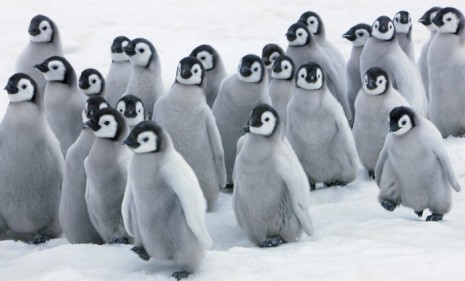The penguin-tagging problem
A new study finds that attaching metal tracking-bands to penguins' flippers decreases the birds' survival rates. Are scientists doing more harm than good?

A free daily email with the biggest news stories of the day – and the best features from TheWeek.com
You are now subscribed
Your newsletter sign-up was successful
Tagging penguins' flippers, a common scientific practice, drastically decreases the birds' rates of survival and reproduction, according to a decade-long study published in the journal Nature. While defenders of tagging say it's essential for tracking population changes and the effect of climate change, penguins who were fitted with metal bands not only swam more slowly than their unbanded peers but also suffered serious health effects: Over 10 years, they produced 39 percent fewer chicks than those left untouched, and their survival rate was 16 percent lower. Should tagging be banned?
Tagging is morally wrong: Until now, it wasn't clear whether bands had an effect or not, says Claire Saraux, one of the article's researchers, as quoted by BBC News. Now that it is, any future tagging is "going to be controversial," since "I'm pretty sure the effect is going to be the same for other species too."
"'Unethical' flipper tags are damaging to penguins"
The Week
Escape your echo chamber. Get the facts behind the news, plus analysis from multiple perspectives.

Sign up for The Week's Free Newsletters
From our morning news briefing to a weekly Good News Newsletter, get the best of The Week delivered directly to your inbox.
From our morning news briefing to a weekly Good News Newsletter, get the best of The Week delivered directly to your inbox.
It's the best technology at the moment: "We should acknowledge that tags will impair animals," says zoologist Rory Wilson in a commentary accompanying the study, as quoted by USA Today. But we can still "strive to minimize the effects, quantifying them where possible so that we can put the resulting data into perspective." With so much information at their disposal, scientists can make sure that the tagging programs "consider whether the gain in (imperfect) knowledge from a scientific viewpoint ethically justifies the harm inflicted."
"Banded study penguins die sooner"
Let's not condemn all banding: To dismiss banding altogether would be foolish, says penguin expert Dee Boersma, as quoted by NPR. Yes, this study "shows that the bands that they used on King penguins harmed the King penguins — I have no doubt about that." But "all bands are not created equal. It depends on what material that they are made of," as well as "how they are shaped," and "how they are fitted to the individual penguin."
"Flipper bands can harm king penguin population"
A free daily email with the biggest news stories of the day – and the best features from TheWeek.com
-
 Elon Musk’s pivot from Mars to the moon
Elon Musk’s pivot from Mars to the moonIn the Spotlight SpaceX shifts focus with IPO approaching
-
 ‘Hong Kong is stable because it has been muzzled’
‘Hong Kong is stable because it has been muzzled’Instant Opinion Opinion, comment and editorials of the day
-
 Magazine solutions - February 20, 2026
Magazine solutions - February 20, 2026Puzzle and Quizzes Magazine solutions - February 20, 2026